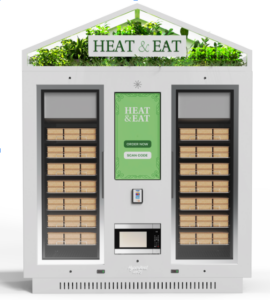In recent years, the rise of smart vending machines has revolutionized the distribution of prepared foods, offering a new way for vendors to reach consumers in convenient locations. Companies like Farmer’s Fridge have capitalized on this trend, using unattended retail to provide fresh, healthy meals to consumers on the go. Their success demonstrates the immense potential for other prepared food companies to use similar smart vending technology to expand their market presence. Here’s how companies can leverage this model to their advantage.
Traditional vending machines have long been a fixture in schools, offices, and public spaces, offering snacks and beverages with limited options. However, the emergence of smart vending machines like those from Farmer’s Fridge marks a new era of automated retail. These machines go beyond simple product dispensing by integrating advanced technologies such as touchscreens, cashless payment options, and mobile app connectivity to offer a seamless and engaging consumer experience. The machines’ ability to store and display fresh products, provide real-time inventory updates, and facilitate contactless transactions makes them ideal for today’s health-conscious and convenience-seeking customers.

Farmer’s Fridge, a pioneer in the smart vending machine industry, has successfully tapped into new markets by addressing the growing demand for fresh, healthy food options in convenient, high-traffic locations. The company’s business model involves preparing fresh meals daily and delivering them to a network of refrigerated smart fridges. These fridges are strategically placed in locations where consumers are likely to look for a quick and nutritious meal, such as universities, airports, and office buildings.
The vending machines are equipped with touchscreens that allow consumers to browse available products, add items to their carts, and pay using credit cards or a mobile app. This model has not only simplified the purchasing process for consumers but has also enabled Farmer’s Fridge to capture impulse purchases effectively. By offering a service that combines convenience with healthy eating options, Farmer’s Fridge has been able to carve out a unique space in the prepared food market.
Smart vending machines, like those used by Farmer’s Fridge, provide an innovative platform for prepared food companies to expand their reach and grow their customer base. Here’s how companies can use these machines to boost sales through different strategies:
One of the most effective ways to leverage smart vending machines is by partnering with existing retail customers to deploy the machines in their stores. By offering these machines at no upfront cost in exchange for a guaranteed supply agreement, prepared food companies can create a win-win situation for both parties. Retailers benefit from having an additional revenue stream without any capital expenditure, while the food company secures a consistent and predictable demand for their products.
This approach enables food companies to expand their footprint across multiple retail locations, increasing their sales volume and market presence. Additionally, because smart vending machines are designed to operate autonomously, they can be placed in various settings—from grocery stores to convenience stores—without requiring additional staff or overhead costs.
Smart vending machines also offer a unique opportunity for companies to secure floor space in high-traffic venues, such as large supermarkets, transportation hubs, hospitals, or corporate campuses. By negotiating agreements to place the machines in prime locations, companies can ensure that their products are prominently displayed and easily accessible to consumers.
In exchange for a guaranteed supply agreement, these venues benefit from having a high-tech, low-maintenance vending solution that meets the needs of their on-the-go customers. These locations can see increased foot traffic and sales, while food companies enjoy a stable supply chain arrangement and increased brand visibility. As consumer demand for convenient, fresh options continues to rise, securing a presence in these spaces can be a game changer for businesses looking to scale up their operations.
Smart vending machines can enable prepared food companies to bypass traditional retail channels and sell directly to consumers. By launching their own branded products through these machines, companies can capture more profit margins per unit sold. This model allows companies to build brand loyalty, create personalized customer experiences, and expand their customer base without the constraints of third-party retailers.
These machines can be stocked with a variety of prepared meals, snacks, and beverages, offering consumers a wide selection of choices. The ability to control branding, pricing, and promotions directly through the machines enables companies to adapt quickly to market trends and consumer preferences. Furthermore, leveraging existing logistics and supply chains already in place minimizes additional costs, making it easier to service multiple machines across different locations.
Artificial Intelligence (AI) can significantly enhance the efficiency and return on investment (ROI) for smart vending machine users. AI can optimize inventory management by analyzing sales data and predicting which items are likely to sell out and need restocking. Predictive analytics can help operators manage supply and demand better, reducing wastage of perishable items while ensuring popular products are always available.
AI can also provide personalized recommendations to consumers based on their purchase history, increasing customer satisfaction and loyalty. For operators, this means higher sales and repeat business. Moreover, AI-driven predictive maintenance can help prevent downtime by alerting operators to potential technical issues before they become major problems, ensuring machines remain operational and profitable.
The rapid adoption of smart vending machines by companies like Farmer’s Fridge highlights the enormous potential for growth and innovation in the unattended retail sector. These machines, with their advanced technology and versatile applications, offer prepared food vendors an effective way to expand their market reach, boost sales, and improve operational efficiency. By providing machines to current retail partners, securing floor space in high-traffic venues, and going direct to consumers with their own branded products, food companies can leverage smart vending technology to unlock new revenue streams and stay ahead of the competition. With the added power of AI, these machines can deliver an even greater return on investment, making them a smart choice for any forward-thinking food company looking to scale.
© 2024 HyperVend, Inc. All Rights Reserved